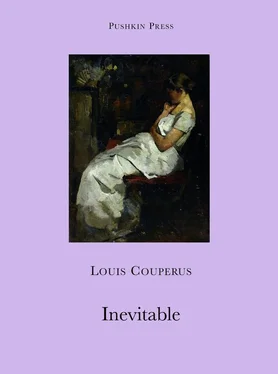She spent these days in bed, she slept, she dreamed, woke again and could not shake off the sense of expectation. Now and then she had a slight fever and it was better to stay in bed. Mostly he stayed with her. But once when Duco had gone off to get something from the pharmacy, there was a knock at the door. She jumped up in bed, afraid, afraid to see him , the one she was constantly thinking of … Half faint with alarm, she opened the door a fraction. But it was the postman with a registered letter. From him! Even more brusquely than the last time, he wrote that immediately on receipt of his letter, she must send a telegram telling him the date she was arriving. And that if by such and such a day — he would work out which — he did not receive her telegram, he would take the night train to Florence and would shoot her lover like a dog at her feet. That he would not hesitate for a moment. That he did not give a damn about the consequences. The passion and rage that this short letter exuded struck her in the face like a red storm. She knew him and knew that he would do it. As in a flash she saw the dreadful scene, saw the murdered Duco fall, bathed in blood. And she was no longer in control of herself. At a distance, because of the red rage of that letter, she had become completely his object, his thing. She had hurriedly torn the letter open, even before she had signed the postman’s book. The man was waiting in the hall. It flashed through at dizzying speed, it swirled before her like a whirlpool. If she hesitated another moment, it would be too late, too late for Duco … And she asked the postman, nervously,
“Can you deliver a telegram for me straight away?”
No, he couldn’t: it wasn’t on his way.
But she begged him to do it. She said she was sick, that she must send the telegram at once. And in her purse she found a ten-franc gold coin and gave it to him as a tip. She also gave him money for the telegram. And the man promised. And she wrote the telegram: Leaving tomorrow, express.
It was a vague telegram. She did not know what express; she had not been able to look up the timetable. Would it be in the evening or very early in the morning? She had no idea. How could she leave? She had no idea. But she thought the telegram would calm him down. And she would go. There was nothing to be done. Now she had fled in desperation, she saw clearly: if he wanted her back, back as his wife, she had to go. If he had not wanted this, she could have stayed, anywhere, despite her sense that she belonged to him. But now that he wanted it, she had to go back. But how, how was she to tell Duco! She was not thinking of herself, she was thinking of Duco.
She saw him in front of her in a pool of blood. She forgot that she had no money left. Should she ask him? Oh God, what was she to do? She could not go tomorrow, despite her telegram! She could not tell Duco she was going … She had wanted to sneak off to the station while he was out … Or should she tell him … What would be the least hurtful? Or … should she tell Duco everything and … run away … together with him, run away somewhere, and tell no one where … But if he discovered them! And he would find them! And then … he would … murder him!
She was almost delirious with fear, not knowing what to do, how and what … There was Duco’s footstep on the stairs … He came in, bringing her the pills … And as always, she told him everything, too weak, too tired to dissemble, and showed him the letter … He snorted in fury, hatred, but she fell down at his feet and grasped his hands. She said that she had already replied … He became suddenly cool, as if overwhelmed by the inevitable. He said he had no money to pay her fare. Then, once more he took her in his arms, kissed her, begged to be his wife, said he would kill her husband, just as he was threatening to kill him. But she sobbed and refused, although she remained clinging desperately to him. Then he resigned himself to the fateful omnipotence of the silent pressure of life. He felt himself dying inside. But he wanted to stay calm for her sake. He said that he forgave her. He held her, sobbing, in his arms, because the feeling of him calmed her. And he said that if she wanted to go back — she nodded dejectedly — it would be better to telegraph Brox and ask for the fare and give a clear date and time of arrival. He would do it for her. She looked at him in astonishment through her tears. He composed the telegram himself and left. My darling, my darling, she thought as he went, feeling the pain in his divided heart. She threw herself on the bed. When he returned he found her in hysterics. When he had tended to her, and tucked her in bed, he sat down beside her. And with a dead voice he said:
“My love, calm yourself. The day after tomorrow I shall take you to Genoa. We’ll say goodbye there, for ever. If it can’t be otherwise, that’s how it must be. If you feel that that’s how it must be, then that’s what must be done. If you feel so strongly that you must go back to your husband, you may not be unhappy with him. Calm yourself, calm yourself, my love.”
“Will you take me?”
“I’ll take you as far as Genoa. I was able to borrow some money from a friend for that. But the main thing is that you try to be calm. Your husband wants you back; he won’t want you back to beat you. He must have feelings for you, if he wants that. And if that’s how it has to be … it may be good … for you. Although I can’t see it …
He covered his face with his hands and, no longer able to control himself, burst out sobbing. She pulled him to her. She was calmer than he was now. While he sobbed with his head resting on her pounding heart, she calmly stroked his forehead, her eyes distant, looking through the walls of the room …
NOW SHE SAT ALONE in the train. By tipping generously they had been able to travel alone at night and no one had disturbed them in their compartment. They had not spoken, but had sat close together, hand in hand, eyes focused far ahead, as if staring at the approaching point of separation. The gloomy thought of that separation did not leave them, but raced along with the rattling train. Sometimes she thought of a train crash, and of how welcome it would be to die together. But inexorably the lights of Genoa had appeared. The train had come to a halt. And he had opened his arms and they had kissed, for the last time. As she clung to him, she had felt his pain. Then he had let go of her and hurried away without looking round. She watched him go, but he had not looked round and she saw him disappear into the morning fog, shot through with points of light that hung about the station. She had seen him disappear among the other people, seen him dissolve into the haze of fog. Then her silent despair and desolation had grown so great that she had not even been able to cry. Her head slumped forward, her arms went limp. Like an inert thing she allowed the roaring, rattling train to carry her further.
A white pre-dawn had risen on the left over the mirrorlike sea and as the first daylight imparted a blue colour to the water, the horizon became discernible. The train continued for hours, while she sat motionless, looking out to sea and feeling almost numb with desolation and irresponsibility. She was now going to allow life, her husband, the train to do as they wanted with her. As if in a weary dream she thought of the gradualness of everything, and of her own unconscious self, of the first rebellion against her husband’s dominance, of the illusion of her independence, the pride of her sense of self and all the happiness of the gentle ecstasy, all the gladness of harmony achieved … Now it was over; now all question of free will was vain. The train was taking her to where Rudolf was calling her, and life had been around her, not very roughly, with a gentle pressure of ghostlike hands, which pushed and guided and pointed …
Читать дальше












